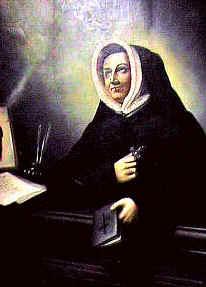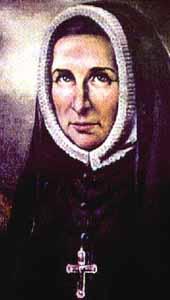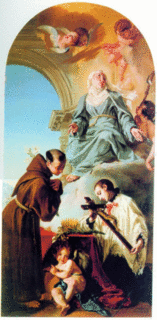
France during the 1700's was to play an important part on the world stage, by helping the Americans to fight for independence from England. This would cause major ructions in the diplomatic arena between England and France, and in 1778, an incensed England declared war on France.
This alliance would prove to be problematic ones for France, as it help supply the American revolutionaries to fight on against the English troops, by providing military and weapons. The American Revolution also brought other countries into this conflict, as Spain allied itself to France and the burgeoning United States. And Holland also came under fire from the English for supporting the French in this conflict. There would be much fighting and even more negotiations before this conflict came to its conclusion, with the overthrow of British rule in the America's, and the birth of a new nation.
But it is 1779 that a little baby was born to France, she would be baptized with the name Madeleine Sophie Barat, as she showed signs of a premature birth and was very frail, her parents had her baptized very quickly.
But Madeleine would surprise all members of her family by her exuberant and extrovert nature, as she got up to high jinx and laughed and played with her siblings, much to the disapproval of her parents. Her family though not wealthy were able to provide a good living for their family as Madeleines father was in the wine business. And many times the children would help their parents pick the grapes to make the wine, which they then sold to their region.
Though Madeleines parents could be austere, this did not prevent their little one from enjoying life around her as she bubbled over with the latest excitements and little joys of life. It was thought best to place Madeleine’s education into the hands of their son, Louis, who was also studying to become a Priest. Though Madeleine's temperament was extroverted, she took to study like water on a ducks back, for underneath all the exuberance was a deep and growing love for her Faith.
Unfortunately the French Revolution would intrude upon Madeleine’s studies, so she was forced to delay her education and look for employment; she eventually found work as a seamstress which she excelled at. But it was the imprisonment of her beloved but austere brother Louis which would leave an impact on Madeleine as she prayed unceasingly for her brothers release from the bloody thirsty revolutionaries!
Her prayer was heard and upon the fall of the despotic Robespierre, Louis Barat was a free man, he then asked for Madeleine's help to further her education but also to continue a life of service to God. Upon completing her education, Madeleine started teaching the little children of her area, the rudimentaries of the Catholic Church. She enjoyed this immensely as her heart was overjoyed to be amongst little ones who had suffered much under the dreadful revolution!
But it was in 1800 that Madeleine would be introduced to Brother Varin who would change the course of her life, and influence her in turning her many gifts to help found a religious Order to educate the poverty stricken children of the area. After much prayer Madeleine chose to help Brother Varin and formed a small society called, Society of the Sacred Heart, of which she became its superior.
The Sacred Heart movement took wing and it spread to many different regions of France, this made life very busy, but for an extrovert like Madeleine, this proved no problem. During this time as Mother Madeleine traversed all over France, she also opened orphanages and schools where education would be free to those who could not afford to pay a school fee.
But Mother Madeleine knew that without prayer, nothing could be achieved, so Mother Madeleine led all those around her to rely totally on prayer and the Providence of a Loving God to help them in their needs. Prayer was to vital to Mother Madeleine that she spent several hours a day on her knees in deep prayer for her community and for the poor they were helping.
During all her mission work, Mother Madeleine overlooked any personal inconvenience and sufferings and worked to establish her Convents, orphanages and other enterprises. This required a great deal of diplomacy on Mother Madeleine’s part as France recovered from the reign of terror brought on by the revolutionaries. Mother Madeleine showed great skill in dealing with the civil authorities, Church authorities and people within each region, this took a heavy toll on her health, but Mother Madeleine persevered to help maintain her Order and its good works.
It was during this period that Mother Madeleine welcomed in a lady by the name of Rose Philippine Duchesne. This sister later would go to the America's and help establish the Order and to alleviate the sufferings of the poor in America.
During all the tumult of the French revolution, her own suffering and pain, Mother Madeleine always kept her spirit of joy and her love for all, shone in her face. The children adored this dear woman, who brought them not only love, but also a way out of their own impoverished circumstances, Madeleine was truly a mother par excellence to these poor children.
Mother Madeleine worked right up till her body could work no more, her love for the poor far outweighed any concern for her own health or comfort.
Mother Madeleine Sophie died in 1865.
Madeleine Sophie Barat was canonised in 1925 by Pope Pius Xl.
Peace of Christ to ALL
Copyright © 2005 Marie Smith. All rights reserved.

